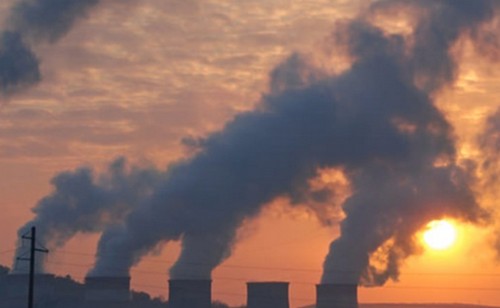Conservation Commentary
Libertarians certainly don’t have all the answers for ridding the world from pollution, but neither does anyone else. One thing libertarians do understand is that governments are the worst polluters of all.
There are exceptions but it’s otherwise axiomatic that people take better care of their own stuff than stuff just handed to them with an expectation that they are “entitled” to it simply because they are occupying space and breathing.
People with no skin in the game, those who have risked nothing and put forth no effort in the creation of a thing strongly tend to value that thing less than if they had earned it.
The same is true with the environment. It’s why private property is better tended than so-called “public” property, which actually means government-owned but taxpayer-funded.
It’s another way of stating Reed’s Rule:
“Any thing that is politicized ceases to be about that thing and becomes all about the politics.”
Environmentalism is no exception; in the public sphere environmentalism is all about the politics.
Yet many people are totally immersed in the conviction that if government doesn’t do everything, including saving the planet, nothing will possibly get done. When libertarians try to explain how private sector solutions work in any field others immediately cherry-pick their way to the most seemingly intractable concepts they can imagine. Without government old people will die, the poor will be thrown into the streets, there will be no cops, no courts, no national defense, and that granddaddy cliché of all: “Who will build the roads?”
The slightly more thoughtful statist will insist that big corporations will pollute us into oblivion without government to stop them. What they fail to confront is that all governments everywhere on the planet and throughout history are run at the very top of the power structure by psychopaths, and psychopaths by definition just don’t care about anything or anyone but themselves.
But let’s take one issue at a time. How do we handle the widespread problem of air and water pollution without government? We can start by accepting the simple fact that the statist’s sacred big government is the biggest polluter of all.
In 2015 the Foundation for Economic Education pointed to a report that showed governments—federal, state and local—are the worst polluters. Looking at both “public and private entities’ compliance with the US Clean Air Act and Safe Drinking Water Act” the report found that “compared with private firms, governments violate these laws significantly more frequently and are less likely to be penalized for violations.”
A year earlier Newsweek told us “The US Department of Defence [sic] is one of the world’s worst polluters. Its footprint dwarfs that of any corporation: 4,127 installations spread across 19 million acres of American soil” in 39,000 contaminated sites.
Political Pollution and Corporate Contamination
Of course hardcore statists will contend that without government the pollution would be even worse. But they’re living in a fantasy, pretending that the very politicians with the most power to actually do something about pollution won’t just sniff the air and sip the water and then do nothing once ReallyBiggCorp Mfg. offers a few million bucks for their re-election campaigns or threatens to shut down operations in the politicians’ districts and lay off thousands of their constituents.
Asking the biggest polluter to stop pollution is like asking the Mafia to protect us from the Mafia.
So how would a laissez-faire free market in a libertarian society handle this problem? Begin by understanding that a “corporation” is a business enterprise that has gone over to the Dark Side: They’ve filed papers of incorporation with government and thereby gained a bundle of special privileges, protections, subsidies and guarantees. In short, a corporation is simply a politically corrupted business.
There would be no corporations or “corporate persons” in a “minarchist” libertarian government because such a government’s only obligation is to maintain police, courts and a military defense, nothing more. In a voluntary “post-statist” libertarian society there would be no government at all in its traditional sense, having been replaced by non-coercive “governance.” Not only is there no coercive government to create and protect corporations but there is no government to stop people from fighting against polluting entities either.
As in any other non-government situation then, pollution would be handled by the people with the most to lose from it: Everyone except those aforementioned psychopaths. The very absence of government protection and the mere threat of unrestricted competition should prevent a smart non-corporation ReallyBiggBiz from jeopardizing its position in the market in the first place. But if they’re not smart and they begin spiting glop into the air and slop into the water people can easily and effectively organize against it.
First imagine a totally free Internet that can’t play favorites with anyone. It becomes a powerful organizing tool. Websites, webzines, social media pages, activist sites spring up to expose and denounce ReallyBiggBiz. The word can spread exponentially across all digital messaging devices. Boycott them! Picket them! Ostracize them! Condemn them! Shun their products! Support their competitors!
Certainly the environmental movement, if they’re worthy of the name, will immediately get involved. Like the biggest eco groups such as the Sierra Club, Audubon Society, World Wildlife Fund, National Wildlife Federation, EarthFirst!, Greenpeace, et al. Many have members worldwide, some wealthy and influential, all working together to motivate their memberships to bring social pressure to bear. Pollution harms all living things remember, not just humans.
Who else cares about air pollution? People with breathing problems. People with loved ones with breathing problems. Everyone else who breathes. Who cares about water pollution? Everyone who drinks water.
But what if ReallyBiggBiz doesn’t have competitors and doesn’t care about their reputation? How about creating a new direct competitor with a clear openly advertised anti-pollution business plan? That will take money of course. But that isn’t necessarily a problem either.
Back to the Internet, and to people with business contacts. Find bankers. Backers. Financiers. Entrepreneurs. Tycoons. Industrialists. Investors. Venture capitalists (the laissez-faire free market kind, not the crony corporatist kind.) Use crowdfunding for smaller contributors and Wall Street for the big money.
The new company will be at a disadvantage, possibly needing to sell their competing products or services at a higher price to offset their enormous expenditures on pollution control efforts. But anyone worthy of the title “Green”—or just “intelligent human being”—will gladly pay more to support them, thereby forcing the hand of ReallyBiggBiz or forcing them out of business.
And don’t misunderstand the term “forcing” here. There is no violation of the libertarian non-aggression principle against the initiation of physical force, intimidation or fraud. Social, economic, business, psychological or cultural “force” is not coercive force.
There are likely many more things that can be done to control would be monopolists, and that includes people finally understanding the fact that no business concern has ever gained and kept a monopoly on anything without the direct connivance of politicians who saw that they could benefit from the conniving. Government itself is the biggest and nastiest monopoly of all.
Yet statists keep thinking that decent people can “fix” government, unaware that such people by definition can never climb high enough up into the governing power hierarchies to fix anything, even assuming that government is “fixable.”
It’s estimated that worldwide there are 70,000,000 psychopaths of varying degrees living among us today. The worst of these are the people who control or enable governments and they have no desire to fix it because government power works perfectly for them. And psychopaths along with their self-serving enablers are “unfixable.”
Political Poseurs vs Peaceful People
As long as good people cling to governments good people will be ruled by psychopaths, by definition those “with an emotional deficiency that keeps them from feeling bad about hurting others.” Psychopaths are “opportunists motivated by self-interest and greed, and inclined to dominate or subjugate those around them through manipulative means.”
Such people don’t care about pollution or any other problem decent people care about. “A psychopath wants what a psychopath wants.” Nothing else. Until people get over the idea that a violent power structure like government can solve their problems their problems will never be solved. By their very nature psychopaths are incapable of caring about you.
The only possible solution requires that the 99% of people who are not psychopaths must learn to work together voluntarily while tearing down the coercively organized power structures that have made it possible for the psychopathic 1% to rule humanity since the beginning of civilization.
The article “How Will the 99% Deal with 70 Million Psychopaths?” from Cognitive policy Works is probably the most enlightening article most people will ever read about psychopathy and its devastating impact on our planet. Libertarians will note that the article’s author doesn’t clearly take the final step to the ultimate solution, that only a truly voluntary post-statist society based on a clearly articulated non-aggression principle can both promote human flourishing while channeling psychopathic behavior into productive uses.
Without this understanding if you’re pro state you’re pro psychopath, meaning you’re not fighting pollution but actually helping to sustain it.
Garry Reed writes as The Libertarian Opinionizer at HubPages.com.
























